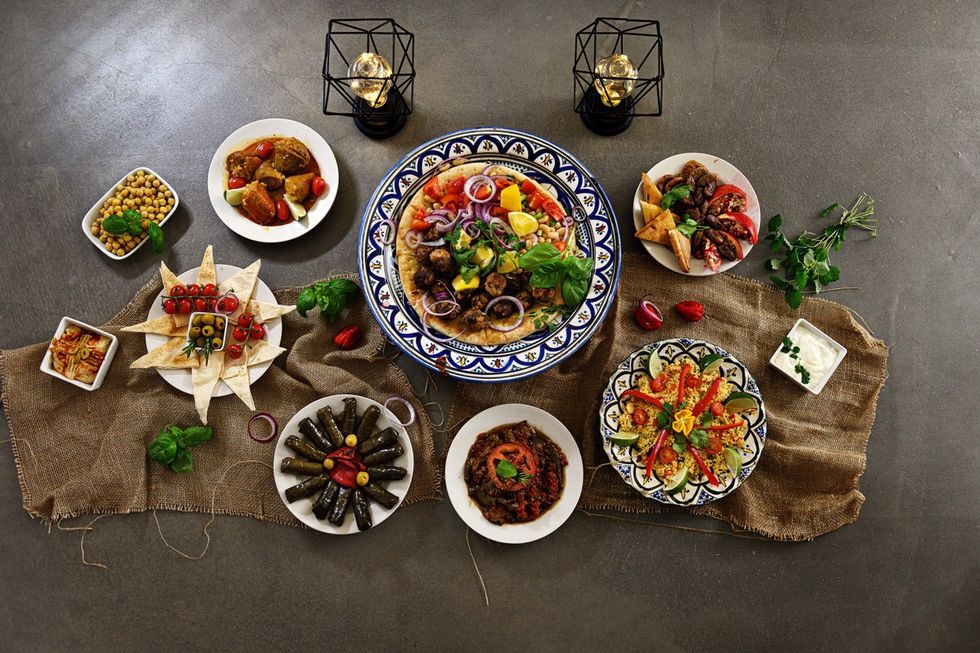While Ramadan includes many important elements like prayer, purification, dedication, controlling desires, and instilling positive habits, a key aspect of the holy month is fasting during daylight hours.
Surviving long days without food and water in a healthy way can be challenging, especially if the meals aren’t nutritious or properly planned. With that in mind, Eastern Eye has compiled top food tips to help those fasting sustain their energy, improve focus during prayers and daily tasks, and avoid pitfalls like fatigue and dehydration. These tips will ensure your fasting journey is both spiritually uplifting and physically sustainable.
Suhoor (pre-dawn meal) tips
< Don’t skip the suhoor meal, as it will set you up for the day. Apart from giving your body the nourishment it needs, foods like fruits, yoghurt, oats, nuts, chia seeds, quinoa, eggs, and smoothies will release energy throughout the day.
< Drink plenty of water and include hydrating foods like cucumber, watermelon, and oranges in your diet. Avoid caffeine, salty, and sugary foods, as they can lead to dehydration and energy crashes later in the day.
< Incorporating protein-rich foods like eggs, yogurt, cheese, and vegetables will provide a feeling of fullness and support muscle health.
< Foods with healthy fats, like avocado, nuts, seeds, or a drizzle of olive oil, provide longlasting energy and support brain function.
< Add high-fibre foods such as lentils, beans, or whole-grain cereals to maintain steady blood sugar levels and prevent hunger pangs.
< Foods rich in probiotics, like Greek yogurt, support digestion and prevent bloating.
< Complex carbohydrates like oats, wholegrain bread, and brown rice will help sustain energy throughout the day.
Iftar (breaking the fast) tips
< Start with the traditional practice of eating dates and drinking room-temperature water for a quick energy boost and to rehydrate the body.
< Avoid processed and greasy foods: Baking, grilling, or steaming is healthier than frying and helps avoid indigestion and lethargy.
< Aim for a balanced meal, including lean proteins (chicken, fish, tofu), healthy fats (nuts, olive oil), and fibre-rich vegetables.
< After a day of fasting, eat slowly and mindfully. This helps digestion and prevents overeating.
< Start with a light soup, like lentil, vegetable, or chicken broth, to aid hydration, soothe the stomach, and prepare it for heavier foods.
< Fresh salads with tomatoes, cucumbers, and leafy greens alongside the main dish will hydrate your body and give it a great vitamin boost.
< Swap sugary fizzy or syrup-based drinks for fresh fruit-infused water, unsweetened iced tea, or coconut water. < Break your fast slowly with smaller portions to aid digestion and prevent overeating.
< Replace sugary, creamy desserts with lighter options like fruit salads or yogurt parfaits.
Between iftar and suhoor
< Drink plenty of water between Iftar and Suhoor to prevent dehydration. Limit caffeine-based drinks like tea, coffee, and cola, as they can increase thirst later.
< Choose healthy snacks like nuts or fruit instead of sugary or processed foods. Dried fruits like apricots, prunes, and figs are great for energy and digestion when eaten in moderation.
General tips
< Plan meals in advance to ensure a balanced diet with all the required elements.
< This saves time, reduces reliance on unhealthy convenience foods or processed takeaways, and prevents food wastage, saving both money and resources.
< If you don’t like drinking lots of water, eat fresh fruit or make smoothies. < Include superfoods like chia seeds, dates, and almonds to boost your nutrient intake.
< Cook with healthier oils and use ghee in moderation. Olive and avocado oils are recommended. < Opt for chamomile or mint tea instead of coffee or tea to aid digestion and relaxation.
< Although it’s easier to use frozen ingredients, cooking with fresh products like garlic, ginger, and vegetables will immensely increase flavour and nutrients.
< Healthy food choices include cucumber, tomatoes, chicken, beef, fish, lamb, lentil soup, broccoli, spinach, broad beans, cabbage, chickpeas, brown rice, couscous, avocado, and fruits such as bananas, melons, kiwis, and clementines.
< Eating fruit at the end of your meal helps facilitate digestion.
< Tidying as you go along while preparing meals will make you more productive and reduce stress, creating a clean space that enhances efficiency and gives you more time to focus on the dishes.
< Monitor your body throughout the month.
< If something doesn’t feel right or you experience unusual fatigue or dehydration, adjust your diet accordingly.
< Minimise processed foods when possible.
< Don’t skimp on quality, especially when buying fresh foods like eggs, fruit, and vegetables. You can even grow your own produce, which is easier than you might think.
< Avoid white foods like bread, pasta, and rice whenever possible.
< Incorporate turmeric, cumin, or ginger into your meals for anti-inflammatory benefits and extra flavour without added calories.





















